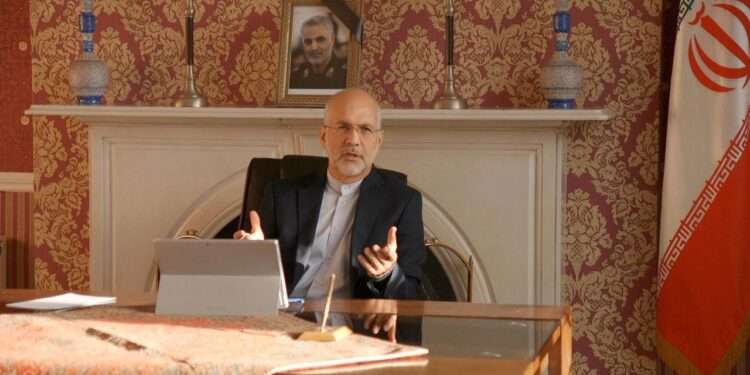by Miceál O’Hurley
DUBLIN – In December, 2019 news emerged of a novel strain of a coronavirus with an alarming infection rate. To date, some 571,697 people worldwide have been reported to have died because of the Covid-19 pandemic. The pandemic’s toll throughout the world has been devastating, wrecking economies, stressing health care systems and causing countries around the world to impose travel bans and restrictions to thwart the spread of the virus. As Ireland continues to lift many of the restrictions previously imposed to help contain the Covid-19 pandemic it gives us time to reflect upon the work of diplomacy in action and the critical role played by the Diplomatic Corps in continuing to serve people during the crisis.
We are profiling several diplomatic missions in Ireland to provide an insight into how diplomacy has been conducted during these trying circumstances and provide some insight into the challenges that may lie ahead. In this interview, the Iranian Ambassador, His Excellency Dr. Masoud Eslami was kind enough to share some of his thoughts with me.

Prior to his appointment in Ireland, Dr. Eslami served as an advisor to Ministers of Foreign Affairs on issues of international law and relations for many years. He was a Professor of International Law and Relations at the Graduate School of International Relations in Tehran and he also served as Dean of the School of International Relations and Diplomatic Academy of Iran for five years. He received M.A.L.D. and Ph.D. degrees in Law and Diplomacy from the Fletcher School of Law and Diplomacy. He also holds an LL.M. degree from Yale University Law School and a Master’s degree in political science and Islamic studies from Imam Sadegh University in Tehran. His Excellency Dr. Masoud Eslami presented his letters of credence extraordinary and plenipotentiary to President Michael D. Higgins as the Ambassador of the Islamic Republic of Iran to Ireland on 28 November 2018.
Your Excellency, I appreciate you taking a moment to discuss the events of recent months and the Covid-19 pandemic with us and how it has impacted the Iranian Mission to Ireland of late.
What did you find to be the greatest challenge that emerged for your Mission during the Covid-19 pandemic?
As with all missions in Ireland, the most important challenge we faced was safeguarding the health of staff and their families and the Iranian community in Ireland. The other core priority for us was to establish the most effective and appropriate means of providing ongoing assistance to the Iranian community during this extremely difficult time.
How many people did your Mission help return home throughout the Covid-19 pandemic?
The Embassy helped 15 Iranian and non-Iranian people to return to their home country.
With a general prohibition on travel and restricted visits to Embassies in Ireland, what are some of the ways your Mission adapted to meet the needs of people asking for services?
In line with the restrictions imposed in Ireland and the Irish government’s guidelines, the Embassy closed its consular section to the public. Thereafter, anyone who required consular assistance could talk to a member of staff via phone and they were directed to the Embassy’s website, where they could apply for all consular services.
Was your Mission involved in helping to facilitate the provision of Personal Protection Equipment (PPE) to Ireland or within the EU? If so, please explain.
Our Embassy would have liked to have been in a position to facilitate the provision of PPE and medical aid to ease the chronic shortages experienced in many countries. As Iran was severely hit during the early stages of the global spread of the Covid-19 virus, there was an urgent need for PPE and medical supplies at that time. However, the national effort to import these essential humanitarian supplies was severely hampered by the continued imposition of US sanctions.
Since then, Iran has made tremendous strides in developing its healthcare manufacturing sector in the area of PPE. Iran hopes to be in a position to offer future assistance with the global effort to suppress Covid-19. For instance, Tehran will host the 6th International Exhibition on Pharmaceuticals and Related industries from 22nd to 24th September 2020 which promises to be the biggest pharmaceutical event in the region. (see: http://www.iranpharmaexpo.com/index.php/en/) Iran has also been able to provide substantial amounts of PPE to neighbouring countries like Afghanistan.
There are accounts of diplomats, their spouses or staff serving around the world who fell victim to Covid-19 in the service of their countries. Did your Mission or country experience any losses or illnesses in your diplomatic community during the Covid-19 pandemic to date?
Thankfully, no member of our Mission has fallen victim to Covid-19. Our thoughts and prayers are with all victims of this virus and their families. In particular, we are all obliged to the medical staff who have risked or lost their lives in combating the virus.
What are some lessons learned during the Covid-19 pandemic that you think will have an impact on how diplomacy is conducted in the future?
We have learned many lessons from the Covid-19 pandemic. First, we have learned about our collective vulnerability as human beings and the inherently-global nature of our inter-dependence. We have also learned that it is only through real global cooperation that we can overcome this worldwide pandemic. In this sense, the diplomatic community is playing one of the most crucial roles in facilitating possibilities for inter-country interaction and cooperation which is so essential for managing this pandemic and recovering from its devastating impact.
From a diplomatic point of view, the greatest threat to the global effort to combat this virus is unilateralism. The deliberate politicisation of this health crisis and attempts to undermine the work of the WHO are particularly damaging. The unilateral US sanctions have been as detrimental as Covid-19 for the people of Iran. They have curbed Iran’s capacity to provide sufficient medical supplies during the pandemic. Future diplomacy needs to contain unbridled unilateralism. Diplomacy and statecraft must develop more empathy, solidarity and accountability to overcome this pandemic and mitigate its effects at national, regional, as well as global levels. Given the indiscriminate effect of the pandemic on humanity at large, it is imperative that future diplomacy be more inclusive and less divisive.
Are there any changes in the way you will provide Consular services for the foreseeable future?
Because online forms of consular assistance have worked well for the vast majority of people, we expect this mode of service to continue into the foreseeable future. We will also supplement this online service with direct assistance for people unable to access the internet.
What are the plans for your country to move towards a ‘normalisation’ of travel and tourism?
The first priority is to safeguard the health of our people. However, because the situation regarding this virus is continually evolving, plans for its suppression and containment will need to continually adapt to changing contexts. So, during periods of high transmission of Covid-19, the authorities in Iran have instigated travel restrictions as they were required (particularly on a region-by-region basis). Even during periods of low transmission, the government and health authorities in Iran have advised that when people travel they should wear face coverings and observe physical distancing and coughing etiquette at all times. Places of worship have been closed and regulations have been applied to religious pilgrimages to prevent large gatherings of people.
Tourism and travel businesses in Iran have been severely affected by the pandemic and, of course, everyone wants to return to “normal” as soon as possible. When conditions permit, Iran will welcome all opportunities to facilitate travel and tourism on a scale that existed prior to the pandemic.
Any pandemic is a tragedy. But even in such situations there are always stories that inspire. Would you care to share one?
As in every country across the world, in Iran we have also seen how this terrible pandemic has brought out the best in so many people. There have been countless examples of the selfless sacrifices made by doctors and nurses and other healthcare workers. Also, so many volunteers and NGOs have risen to the challenge of providing care and assistance to those in need.
However, if I wanted to mention just one inspiring story, I would recall the heart-breaking situation of Iranian children born with the rare genetic and extremely painful skin condition, Epidermolysis Bullosa (EB), who have been denied access to healthcare products which ease their pain due to cruel US sanctions. The inspiring aspect of this story is that volunteers, Iranian people and other individuals from different countries launched a social media campaign to mobilise sympathy to address this problem.
Were there opportunities to work with the Irish Government and/or other missions during the pandemic?
The Covid-19 pandemic has changed many aspects of inter-governmental relations. In response to Covid-19 restrictions, the Embassy quickly adapted to the new situation by prioritizing efforts to keep the lines of communication open with the Irish government and other missions accredited to Ireland using alternative means of communications. It was important to receive updates from the Irish Department of Foreign Affairs and Trade on the situation in Ireland and to monitor and update similar information on the situation in Iran.
From the outset, it has been my belief that the global nature of this pandemic has made effective bilateral and international cooperation all the more imperative. Advancing this theme of global solidarity, a letter to the Editor was published on my behalf in The Irish Times on 28 March 2020. In this letter, I argued that Covid-19 demonstrated the futility of divisive politics, both at local and international levels and I commended the ways in which the people of Ireland showed compassion towards Iranian people who were struggling with amazing fortitude to deal with a very severe outbreak of the virus at that time.
The Embassy also focused on enhancing awareness in Ireland of the unique difficulties being faced in Iran during this crisis as a direct result of the devastating impact of US sanctions. I wrote a letter to the Minister for Foreign Affairs and Defence, Mr. Simon Coveney, calling on the Irish government to “disregard the US unilateral sanctions and take whatever measures it can to end the crippling sanctions that have been forced upon the Iranian people by the US government.” I also wrote to all Irish political representatives, as well as religious leaders, arguing that Ireland’s human rights-based approach to foreign policy would be essential to strengthening the level of global cooperation, multilateralism and international solidarity required to overcome the devastating impact of US sanctions on the people of Iran, particularly during the pandemic crisis.
Your Excellency, I truly thank you for taking time from your demanding schedule to discuss the unique challenges the Islamic Republic of Iran faces during the Covid-19 pandemic, especially in light of the existing sanctions. On behalf of all of us, allow me to wish you and your staff success in your diplomatic endeavours and good health and prosperity to the Iranian people.
Thank you, Miceál.
















































